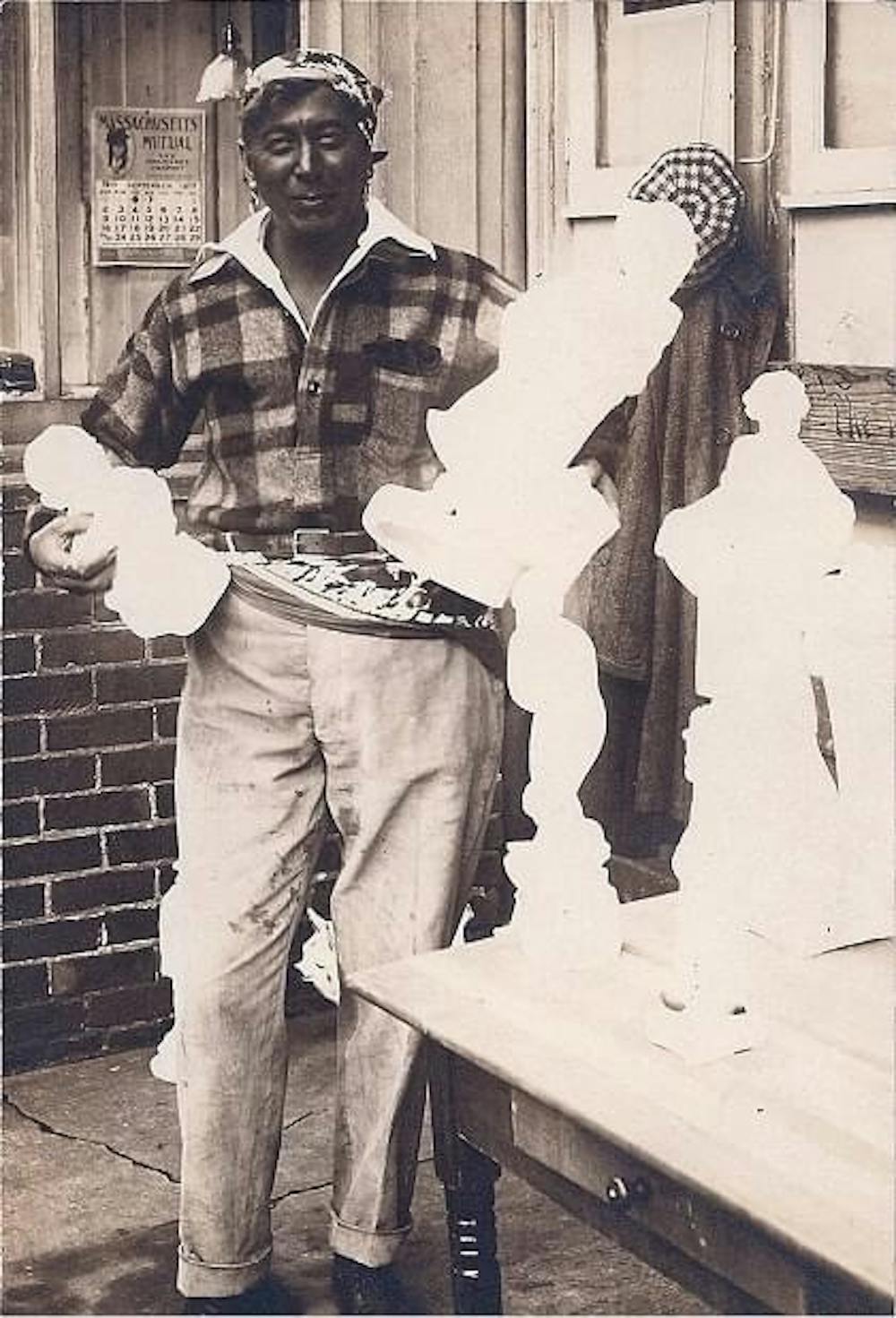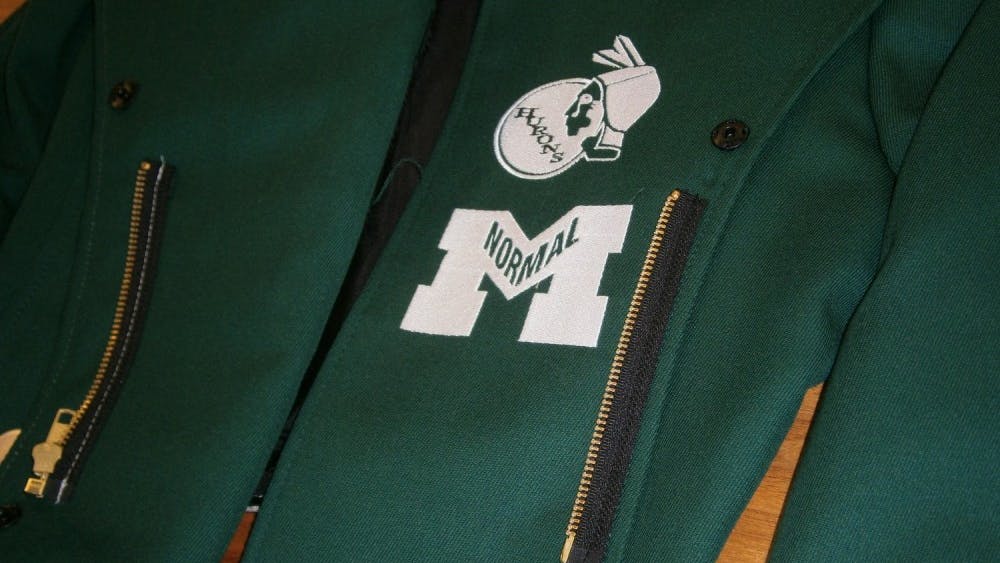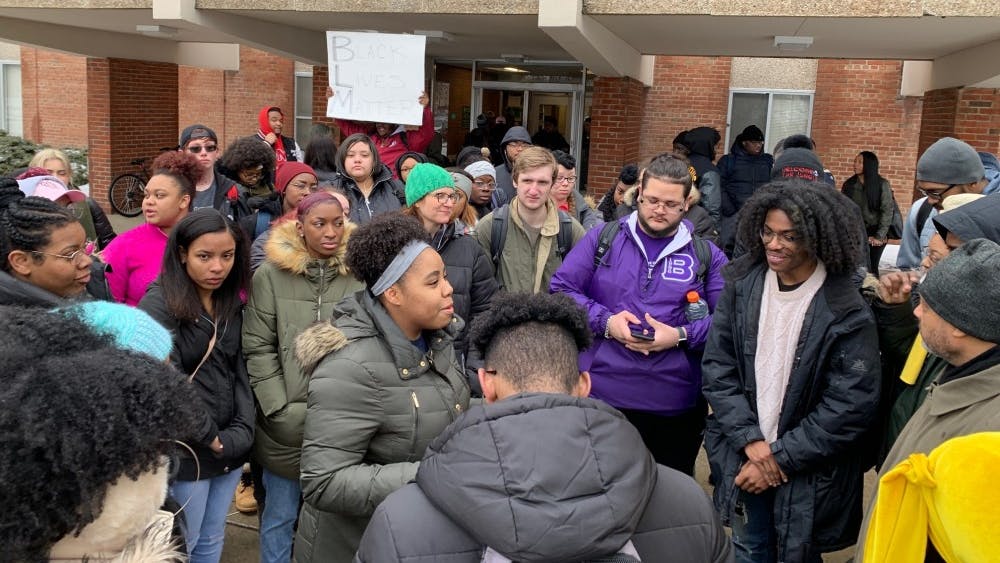Eastern Michigan University officials are discussing the next course of action after learning the racist historical tie to one of the Quirk-Sponberg Theatre’s namesakes, Daniel L. Quirk Jr.
Quirk was a prominent figure in Ypsilanti’s past. He came from a wealthy, well-known family, that dominated politics and economic life in the City of Ypsilanti for over a century. Quirk also served as the Director of the Peninsular Paper Company and President of the First National Bank, both of which his father founded. With his position in the community, he was able to become the leading force behind the theater movement in Ypsilanti.
One aspect of Quirk’s history has gone unmentioned for many decades. Quirk frequently directed and performed minstrel shows, where members of the community joined together in painting their faces black, singing songs associated with slavery and performing in a manner that portrays people of color in an offensive way.

Daniel L. Quirk in blackface (1917). Photo courtesy of the Ypsilanti Historical Society.
According to Siegfried, minstrel shows or “blackface parties” were not uncommon throughout the early 1900s, especially for white, upper-class individuals. These shows were well-publicized and performed on EMU’s campus (previously known as the Michigan State Normal School) as sanctioned events, as shown in the archives of The Normal News.

A blackface party at the Quirk mansion. Photo courtesy of the Ypsilanti Historical Society.
Minstrel shows declined in popularity during the early 1930s and became less acceptable as the civil rights movement progressed. However, this part of Quirk’s past did not disqualify him from having a building named after him on EMU’s campus.
The original Quirk Theater was built in 1958 and underwent renovation in 1985, adding a second theater to the building, named after former EMU President Harold Sponberg. The building is now referred to as the Quirk-Sponberg Theatre and is home to the EMU Department of Communication, Media and Theatre Arts.
Photos and old newspaper articles detailing Quirk’s blackface performances can be found at the Ypsilanti Historical Museum & Archives. Though, due to COVID-19 the Archives and Museum are closed to the public until further notice.
Geoff Larcom, the executive director of media relations at EMU, said the university was not aware of this side of Quirk’s past until Aug. 30 when a social media post from Matt Siegfried, a local historian and EMU graduate, surfaced on Facebook. Following the discovery, the university immediately began a comprehensive investigation to determine the next steps, which may include changing the name of the theater.
“The University is deeply concerned about the racist behavior conveyed in the post,“ Larcom said. "These actions are an affront to everything we stand for as an institution. Our investigation and resulting actions will reflect that deep concern and will be shared with the campus community.”
Pamela Cardell Cato, assistant managing director in the School of Communication, Media and Theatre Arts, said she was saddened when she learned of Quirk’s history but also sees this as an opportunity for the University to make a change and reflect where it stands today.
“Is this news that we’ve learned disheartening? Yes,“ she said. "Does it make a lot of us really sad, and angry, and emotional? Yes. But [it also offers] us a really great opportunity to stand up and say, ‘You know what? Now we get to tell you what we truly believe in. Now we get to make positive change. Now we get to move forward and be encouraging, supportive and truly representational of everybody that walks through the halls of this building."
Cardell Cato said the university does not want to rush into a hasty response, and is therefore looking at all options with careful consideration. Some of the options being discussed include renaming the Quirk Building or putting up historical displays, in the theater’s lobby, allowing issues to actively be discussed.
Darien Vaughn, a senior at EMU, who performed for the first time in the Quirk Theater in 2015, said he is “not super upset” about Quirk’s demeaning and racist show history because he understands it was the way the world was in Quirk’s era. However, Vaughn did acknowledge that it would be off-putting if the University chooses to uphold Quirk’s name.
Vaughn dismissed the idea of displaying Quirk’s history in the lobby of the theater. He explained that by doing this, the university is creating a daily reminder of the theater’s racist background.
“That’s like sending us a text message every day saying, ‘You’re about to go to class in a building that’s named after a racist man," Vaughn said. "It hurts a little because we give so much and as Black performers, we love to perform in the space . . . And it hurts that it’s named after somebody who didn’t respect us and didn’t respect our culture.”
Coming up with his own solution, Vaughn said he would like to see the theater named after a professor who has made an impact on the University. He suggested the late Terry Heck Seibert as his top pick. Seibert was a professional actress and co-director of Theatre at EMU who unexpectedly died in 2018.
“She literally gave her whole professional career to the university,“ Vaughn said. "I would love to see it named after her considering she gave so much and loved the community and she was there for us, I don’t think it would be appropriate to name it after anybody else.”
Quirk’s history coming to light has sparked conversations online about the other namesakes on campus.
“This article sort of sparked a curiosity for me, what else don’t we know?” Cardell Cato said. "What other histories are out there? Obviously, the time was very different when they made the choice to select that person as the namesake. I think there’s a lot of buildings on campus we could certainly look into and maybe [have] that option of renaming.”
Examples include the Bowman-Roosevelt parking lots namesake, Isaiah Bowman, is known for having anti-Semitic views; Frederic Pease, the namesake of Pease Auditorium, was known to perform in minstrel shows (also shown in archives of the Normal News); and Mark Jefferson, the namesake of the Jefferson Science Complex, was involved in the desecration of Native burials on Water Street.
When it comes to the Quirk-named theater, Cardell Cato said she wants people to know that the matter is something the University is taking seriously and that discussions with EMU’s top administrators about the most appropriate course of action began as soon as they learned of the issue.
“We do value and appreciate diversity, and this really was a terrible affront to everything that all of us stand for, so we really want to make sure that we’re going forward unified and that we’re sharing updates with the community as those come about,” Cardell Cato said.










